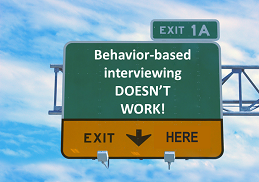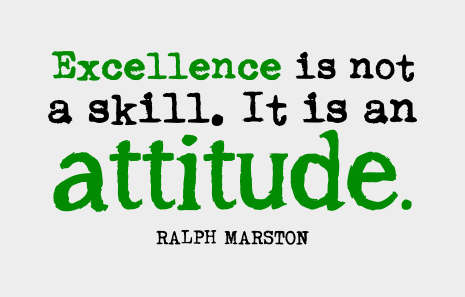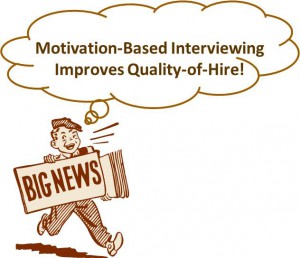Motivation-Based Interviewing Helps Employers Hire High Achievers
Written by Roy Maurer
Julie Clement made some bad hires in the past.
An HR director at the Children’s Aid Society of the United Counties of Stormont, Dundas and Glengarry, based in Ontario, Canada, Clement primarily recruits and hires social workers to assist in the protection of children against neglect and abuse. Employees at the public-sector agency must deliver high-quality service to families and children in need during stressful situations while maintaining compliance with strict government standards. When an allegation is reported, they have a certain amount of time to investigate and submit a determination. They also have a number of children in care to check up on regularly.
“These standards are precise,” Clement said. “Looking back, I realized that some of our hires lacked motivation and passion. Some employees couldn’t keep up with the standards, or the motivation to be compliant with those standards, or the passion to deliver the service that was expected.”
Over 1,000 miles away, the turnover in the sales department at Cook’s Pest Control in Decatur Ala., was consistently problematic.
“We had huge attrition in sales,” said Jerry Baker, vice president of sales for the company. Baker identified that the costly turnover stemmed from hiring the wrong people.
“Not that we weren’t hiring quality people, but it was a question about hiring the right person for the right role,” he said. “One of my core philosophies is that if you have the right people in the right roles in your business you can achieve any success."
> "We needed to figure out how to find a good match and make hires based not on having a great personality or being a nice person, but on having the passion to do what we’re asking them to do,” added Baker.
Finding the right person for the job is a crucial task for any employer and the interview process is a critical component in that determination. Clement, Baker and countless others have traditionally relied on behavior-based interviewing techniques which attempt to provide glimpses of future performance based on past behavior. So how do all the bad hires get through?
“If behavior-based interviewing is so great, why do we have such hit-and-miss results?” asked Carol Quinn, an expert on interviewing and the CEO of Hire Authority, a hiring consultancy based in Delray Beach, Fla. “How can we see some of those marginal hires for who they really are before we hire them? Employers need an interview process that enables interviewers to see the difference between the people who stop at average job performance and those who go above and beyond.”
An Enhanced Interviewing Method
The solution is motivation-based interviewing (MBI). “Motivation-based interviewing is a method specifically developed for hiring high-performers,” said Quinn, the creator of MBI. “It’s a system that seeks to identify high achievers by uncovering their internal drivers and examining both their passion for the job and attitude toward overcoming obstacles to achieve goals.”
The interview method assesses the three components that research has determined to be common to all high performers— attitude, passion and skill.
MBI was developed to eliminate the flaws in behavior-based interviewing, Quinn added.
Behavior-based interview questions allow the applicant to spin back rehearsed responses that benefit themselves and focus primarily on occupational skills. “Skill level does not equate performance level,” she said. “People with great job skills can be unmotivated bad hires.”
In addition, traditional interviews rely heavily on gut feeling, leading recruiters and hiring managers to often end up choosing the person they like most or feel the most comfortable with.
“It’s kind of shameful, but we would conduct basic, standard interviews focused on staying compliant, but not really assessing candidates for performance,” Baker said. “A lot of ‘tell me about yourself’ questions.”
Clement also used behavior-based “what would you do if” scenarios during the interview process. “We recruited on talent, so we had identified what skills we were looking for in these roles, such as time management and teamwork,” she said. “We asked questions to determine whether the person had those skills or not.”
Georgina Johnson, the director of labor relations for the British Columbia Public Schools Employers’ Association, an HR advisory agency based in Vancouver, was also an advocate of behavior-based interviewing. Not only was Johnson conducting behavior-based interviews for the association, she was also training school district staff, principals, vice principals and superintendents on it as part of her job as an advisor.
“Most of the education sector used behavior-based interviews for years,” she said. “When we began using behavior-based interviews, we all thought that we had improved our interviewing skills. We were asking relevant questions about past experiences. We thought it was the best that was out there.”
Baker considered himself a good people-reader due to his many years of sales experience. “I would sit candidates down and go into great detail about the duties of the job,” he said. “I thought that a good salesperson could feed back to me what I had just said, to let me know that they have good listening skills and are paying attention. But I learned that I was hiring people who can ace an interview but are not necessarily high performers. I was asking the wrong set of questions.”
Quinn pointed out that there are loads of “bad behavior-based interview questions and how to best answer them on the Internet.” In fact, many of the most common interview questions actually assist the candidate in spooling back learned, inflated responses, causing interviewers to overrate them.
“Many applicants who are not high performers are interview-savvy,” Quinn said. “Behavior-based questions cannot correctly distinguish between a high performer, an average performer and a poor performer during the interviewing process because savvy, prepared applicants withhold information.”
But interviewers who use motivation-based interviewing know exactly how to expose that information, often without the candidate even knowing they are being assessed on their motivation.
Why MBI Is Superior
The goal of an effective interview process is to select high achievers—those who are able to achieve above-average results on a consistent basis. According to Quinn, high achievers have three characteristics:
Attitude is a much better predictor of future job performance, Quinn said. And she defines this attribute as how effectively—or ineffectively—a person responds to obstacles or difficult challenges. It’s also not something that can be fundamentally modified by on-the-job training or performance management. Every job has its challenges, from difficult co-workers and clients, and being expected to produce better results with less-than-ideal resources, to just plain hard physical work. “Many of our candidates are quality people, but when you put them into the work environment where they have to go outside in inclement weather for example, people end up thinking the job’s not for them,” Baker said.
“The motivation-based method’s main objective is to determine if a person is a high achiever or simply an average worker by asking a series of questions that are designed to see how a person handles obstacles,” Quinn said.
Obstacles force a reaction: either “I can” or “I can’t.” Does the person approach goals and the obstacles that come with those goals with a can-do, problem-solver attitude or does he or she give up, blaming external factors for failure?
“The biggest change between behavior-based interviewing and MBI is the format of the questions and including obstacles in the questions,” Johnson said. “We were asking for a lot of ‘good news’ narratives in our previous questions. ‘Tell us about times you were successful?’
Everyday scenarios in the workplace are not all successful and they are not all easy.”
When Johnson started asking about obstacles, the difference in the response from the candidates was shocking, she said. She began to clearly see which candidates would makes excuses for something they didn’t accomplish, and which ones would problem-solve to come up with different solutions to at least try to overcome the roadblock.
But MBI doesn’t just look at outcomes. “There’s a big difference between an easy success and a failure where the person is still working relentlessly to achieve the goal,” Quinn said. “The easy success tells us very little about how much effort a person tends to put forth when getting to a goal is hard. When someone makes up their mind that a goal is impossible to achieve or deems an obstacle to be insurmountable, they won’t relentlessly pursue the goal like a true high performer would. That’s why attitude-assessment is so powerful,” Quinn said.
“The biggest difference is that you get a true picture of how somebody responds to difficulties that they encounter daily on the job,” Johnson agreed. “Attitude to me is so important, because our hires will be in schools with kids.”
Another important component to MBI is passion. “Don’t underestimate passion,” Quinn said. “If you have someone with an ‘I-can’ attitude, but they’re not interested in the job, no amount of training or incentives will make them a high performer.”
Passion is assessed by determining what motivates the candidate most, and is considered the single most powerful natural self-motivator. “We ask about likes, dislikes, strengths, etc.,” Johnson said. “For example, I was interviewing for a position in our office that would have been working in a very quiet environment,” she explained. “A final candidate said her favorite job was working in a coffee shop because she loved being around people and socializing. I knew she would not be happy here. She was a strong candidate other than that. We had to keep looking.”
Ideally you want a passion-job match, Quinn said. “For example, the notoriously bad service in the customer service industry is not because of lack of training. It’s hiring people who don’t like to serve customers. For people to be highly self-motivated, they must have a high degree of interest and passion for what they are doing. No substitute for passion exists.”
In addition, the MBI process is simple to employ, does not add more time to a traditional interview and is customizable for all organizations.
“It’s simple, even though employers need to spend more time on their questions beforehand, which is a good thing,” Johnson said. “We look at the different skill sets required for a position and break down the competencies required for each role, then develop questions based on that.”
The Results Make the Case
MBI has proven to be a blessing to the organizations that have tried it. Clement began using it in 2016 and now employs it across her organization. “The people I’ve hired since using MBI are higher quality,” she said. “MBI hires have been passionate about the work they do, and have a drive that traditional interviewing just couldn’t target as well.”
She added that an occasional bad hire still gets through, but it’s rare. And it’s made the interviewing and selection process rewarding again, she added.
MBI has been the company standard at Cook’s Pest Control for three years now, Baker said. “I pushed for it companywide, after I had gone through the trainer training. Initially, I thought of it from the perspective of my team members and wanted to make sure that our salespeople were at a high standard. The more we got into it, we thought this was significant for the whole company.”
The entire HR department is MBI trained. “Anyone touching the hiring process goes through MBI training,” Baker said.
And turnover has gone down. “We’ve probably had around a 30 percent reduction in turnover,” he said. “We’ve spread the mantra throughout the company that we only hire high performers. It is defining the culture and has given our hiring managers huge confidence when they approach interviewing, due to the standardized approach.”
Johnson has used MBI to hire staff for about 18 months, as well as provide training on the method to the province’s school districts. “I have been all over this province since, training hiring managers,” she said. “It’s been really popular because quite a few districts want to revamp their whole recruitment process for all positions. And they tell me that the change has been dramatic.”
Johnson said that her clients have told her that high performers’ responses were so much better than others, where previously, the differential between high performers and other candidates was harder to distinguish. “The gap was glaringly obvious,” she said. “MBI brings out a clearer truth from candidates about what they really have experience in and what they don’t. It doesn’t mean we won’t hire a person lacking certain experience; it just means that if I hire that person I know exactly where I need to mentor.”
Clement stressed that MBI opened her eyes. “Learning about it, a light went on,” she said. I have become very passionate about MBI and a strong advocate for it at our agency. I believe in the results.”
Johnson highly recommends its use and going through the training with Quinn. “The training I received from Carol was extensive and held to a high standard. To have somebody who is so generous and passionate about the topic and does such a great job of ensuring that people who are training get high-level results is wonderful.”
MBI must be respected, Johnson concluded. “As long as you respect the process, you will have successful hiring results.”
This article was written by Roy Maurer. Roy covers talent acquisition for SHRM Online. Contact him at roy.maurer@shrm.org and follow him on Twitter @SHRMRoy.
New subscribers receive free (e)book written by Carol Quinn. Subscribe Now!



